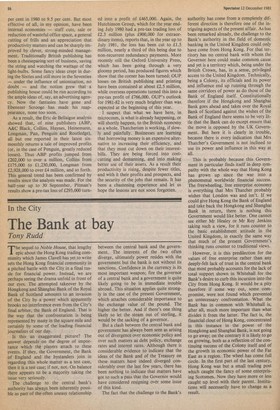In the City
The Bank at bay
Tony Rudd
The sequel to Noble House, that lengthy epic about the Hong Kong trading community which James Clavell has yet to write sets the Hong Kong financial community in a pitched battle with the City in a final tussle for financial power. Instead, we are perhaps seeing the drama unfold in front of our eyes. The attempted takeover by the Hongkong and Shanghai Bank of the Royal Bank of Scotland amounts to an invasion of the City by a power which apparently brooks no interference even from the City's final arbiter, the Bank of England. That is the way that the confrontation is being represented by many in the square mile and certainly by some of the leading financial journalists of our day.
Is this an exaggerated picture? The answer depends on the degree of importance which the players attach to these events. If they, the Government, the Bank of England and the bystanders join in regarding this whole matter as a test case, then it is a test case; if not, not. On balance there appears to be a majority taking the issue very seriously.
The challenge to the central bank's authority has always been inherently possible as part of the often uneasy relationship between the central bank and the government. The interests of the two often diverge, ultimately power resides with the government but the bank is not without its sanctions. Confidence in the currency is its most important weapon; fire the governor of a central bank and a government is quite likely going to be in immediate trouble abroad. This situation applies quite strongly in the case of the present Government, which attaches considerable importance to the exchange value of the pound. The higher the better. And if there's one thing likely to let the steam out of sterling, it would be the sacking of a governor.
But a clash between the central bank and government has always been seen as arising out of divergence over economic policy and over such matters as debt policy, exchange rates and interest rates. Although there is considerable evidence to indicate that the ideas of the Bank and of the Treasury on these matters have indeed diverged considerably over the last few years, there has been nothing to indicate that matters have got to such a pass that the Governor would have considered resigning over some issue of this kind. authority has come from a completely different direction is therefore one of the intriguing aspects of the present affair. As has been remarked already, the challenge to the Bank's authority in the field of domestic banking in the United Kingdom could only have come from Hong Kong. For that territory has no central bank with whom the Governor here could make common cause and yet is a territory which, being under the British Crown, has, in a sense, privileged access to the United Kingdom. Technically, being a Colony, its officials and its power and influence end up running through the same corridors of power as do those of the Bank of England itself. Constitutionally therefore if the Hongkong and Shanghai Bank goes ahead and takes over the Royal Bank of Scotland against the wishes of the Bank of England there seems to be very little that the Bank can do except ensure that the move is opposed by the UK Government. But here it is clearly in trouble, because there is every indication that Mrs Thatcher's Government is not inclined to use its power and influence in this way at all.
This is probably because this Government in particular finds itself in deep sympathy with the whole way that Hong Kong has grown up since the war into a phenomenal worldwide financial success. The freewheeling, free enterprise economy is everything that Mrs Thatcher probably wishes that London was and isn't. If we could give Hong Kong the Bank of England and take back the Hongkong and Shanghai Bank in return, there is nothing this Government would like better. One cannot see either Mr Healey or Mr Roy Jenkins taking such a view, for it runs counter to the basic establishment attitude in the United Kingdom, in exactly the same way that much of the present Government's thinking runs counter to traditional views.
However, it is this predilection for the values of free enterprise rather than any deeply-felt lack of trust in the central bank that most probably accounts for the lack of total support shown in Whitehall for the Bank's desire to curb this incursion into the City from Hong Kong. It would be a pity therefore if some way out, some com promise, were not found which prevented an unnecessary confrontation. What the Bank has in common with Whitehall is, after all, much more important than what divides it from the latter. The fact is, the financial clout of Hong Kong, concentrated in this instance in the power of the Hongkong and Shanghai Bank, is not going to go away; on the contrary it is likely to go on growing, both as a reflection of the continuing success of the Colony itself and of the growth in economic power of the Far East as a region. The wheel has come full circle. In the first part of the last century, Hong Kong was but a small trading post which caught the fancy of some enterprising Scotsmen. Now they have more or less caught up level with their parent. Institutions will necessarily have to change as a result.






































 Previous page
Previous page